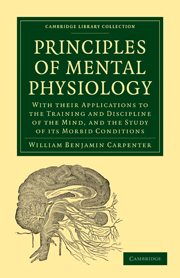 Principles of Mental Physiology
Principles of Mental Physiology Book contents
- Frontmatter
- PREFACE
- Contents
- BOOK I GENERAL PHYSIOLOGY
- BOOK II SPECIAL PHYSIOLOGY
- CHAPTER X OF MEMORY
- CHAPTER XI OF COMMON SENSE
- CHAPTER XII OF IMAGINATION
- CHAPTER XIII OF UNCONSCIOUS CEREBRATION
- CHAPTER XIV OF REVERIE AND ABSTRACTION:—ELECTRO-BIOLOGY
- CHAPTER XV OF SLEEP, DREAMING, AND SOMNAMBULISM
- CHAPTER XVI OF MESMEBISM AND SPIRITUALISM
- CHAPTER XVII OF INTOXICATION AND DELIRIUM
- CHAPTER XVIII OF INSANITY
- CHAPTER XIX INFLUENCE OF MENTAL STATES ON THE ORGANIC FUNCTIONS
- CHAPTER XX OF MIND AND WILL IN NATURE
- APPENDIX. DR. FERRIER'S EXPERIMENTAL RESEARCHES ON THE BRAIN
- INDEX
CHAPTER XVI - OF MESMEBISM AND SPIRITUALISM
Published online by Cambridge University Press: 29 August 2010
- Frontmatter
- PREFACE
- Contents
- BOOK I GENERAL PHYSIOLOGY
- BOOK II SPECIAL PHYSIOLOGY
- CHAPTER X OF MEMORY
- CHAPTER XI OF COMMON SENSE
- CHAPTER XII OF IMAGINATION
- CHAPTER XIII OF UNCONSCIOUS CEREBRATION
- CHAPTER XIV OF REVERIE AND ABSTRACTION:—ELECTRO-BIOLOGY
- CHAPTER XV OF SLEEP, DREAMING, AND SOMNAMBULISM
- CHAPTER XVI OF MESMEBISM AND SPIRITUALISM
- CHAPTER XVII OF INTOXICATION AND DELIRIUM
- CHAPTER XVIII OF INSANITY
- CHAPTER XIX INFLUENCE OF MENTAL STATES ON THE ORGANIC FUNCTIONS
- CHAPTER XX OF MIND AND WILL IN NATURE
- APPENDIX. DR. FERRIER'S EXPERIMENTAL RESEARCHES ON THE BRAIN
- INDEX
Summary
“When the Mind is once pleased with certain things, it draws all others to consent, and go along with them ; and though the power and number of instances that make for the contrary, are greater, yet it either attends not to them, or despises them, or else removes them by a distinction, with a strong and pernicious prejudice to maintain the authority of the first choice unviolated. And hence in most cases of Superstition, as of Astrology, Dreams, Omens, Judgments, &c., those who find pleasure in such kind of vanities, always observe where the event t answers, but slight and pass by the instances where it fails, which are much the more numerous.”
–Bacon, in Novum, Organon.501. “What to Believe?” as to that diversified series of phenomena termed “Mesmeric” and “Spiritualistic,” is a question which most persons have at times asked themselves during the last few years ; and to which the responses have varied with the amount of information possessed by each questioner, with his previous habits of thought, and with his tendency to credulity or to scepticism,–his love of the marvellous and occult, or his desire to bring everything to the test of Science and Common Sense.
502. Some there are, who persist in the determination to disbelieve in the genuineness of all the asserted facts; designating them as “all humbug,” and maintaining that none but fools or knaves could uphold such nonsense.
- Type
- Chapter
- Information
- Principles of Mental PhysiologyWith their Applications to the Training and Discipline of the Mind, and the Study of its Morbid Conditions, pp. 611 - 635Publisher: Cambridge University PressPrint publication year: 2009First published in: 1874


